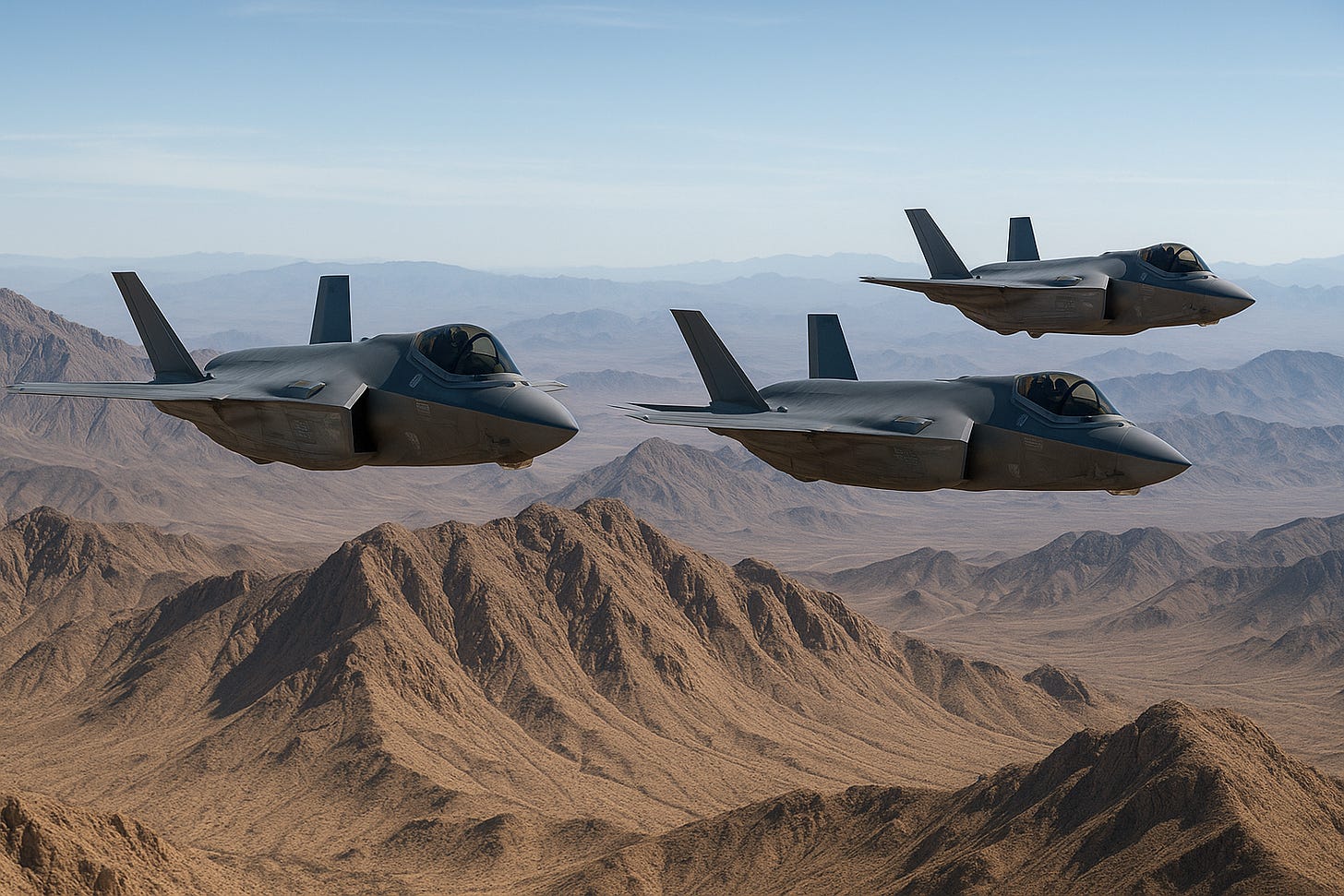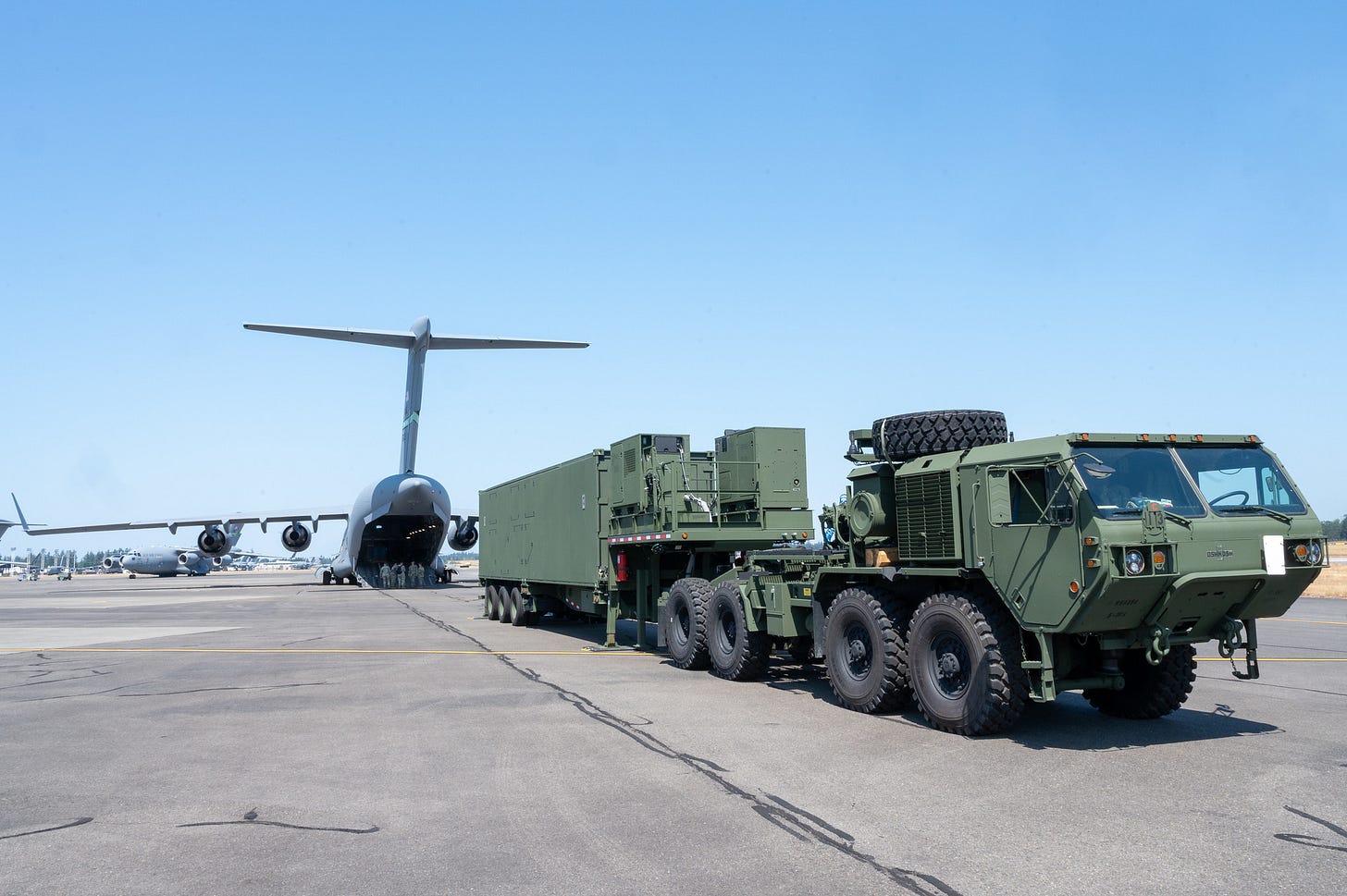10 Things Global News - 18th November 2025
Interesting and important news from around the world
Troop Threat Raises Regional Stakes
UN Backs Gaza Plan Amid Statehood Tension
Settler Arson Attacks Escalate Across West Bank
Sabotage Hits Key Polish-Ukraine Rail Link
Trump Signals F-35 Sale To Saudi Arabia
Judge Flags Missteps In Case Against Ex-FBI Chief Comey
US Pulls Missile System As Japan-China Tensions Rise
Trump Sets Conditions for Backing Russia Sanctions Bill
Hasina Faces Death Sentence as Extradition Tensions Rise
China’s Hidden Lending Network Reaches Deep Into the US
On this day ….
On this day in 2003, the Massachusetts Supreme Judicial Court ruled that denying marriage rights to same-sex couples violated the state constitution. It was the first such decision in the United States and helped shape later legal and political debates across the country.
Although nationwide recognition eventually followed, the issue remains contested: several U.S. states have since attempted to limit or challenge protections through legislation or court action.
Two decades later, the ruling still raises a question about how durable civil-rights gains truly are.
President Donald Trump said he would not rule out sending US troops into Venezuela, as a large American naval deployment in the Caribbean puts military options back on the table. His comments contrasted with earlier suggestions that Washington “may be having some discussions” with Nicolás Maduro, despite repeatedly accusing the Venezuelan leader of running the Cartel de los Soles and sending drugs and violent criminals to the United States.
Meanwhile, Maduro said on state television that he was willing to hold “face to face” talks and repeated calls for dialogue and peace. However, tensions increased as Venezuela ordered a major military mobilisation after the USS Gerald R. Ford entered regional waters, bringing additional warships and thousands of US personnel. As a result, pressure on Maduro widened with a planned US terrorist designation for Cartel de los Soles.
The administration has also signalled openness to strikes in Mexico and Colombia to counter drug operations, indicating broader regional implications.
Sources: Washington Post, The Guardian
The UN Security Council has endorsed Donald Trump’s Gaza plan in a 13–0 vote, opening the way for an international stabilisation force and a possible path to Palestinian statehood. China and Russia abstained as the US secured Arab support by adding references to an independent Palestine, although the language is conditional and tied to reforms of the Palestinian Authority. However, Israel’s prime minister restated his opposition to a Palestinian state, raising doubts over implementation.
Hamas rejected what it called an imposed international guardianship mechanism and said it would not disarm, creating an immediate challenge for the proposed force. Meanwhile, supporters of the resolution said it should lift remaining aid restrictions and begin reconstruction. As a result, both the stabilisation force and a new governance structure would need to operate without clear commitments from troop contributors or clarity on key appointments.
The resolution establishes a Board of Peace chaired by Trump, alongside a technocratic Palestinian committee, but the composition and authority of both bodies remain uncertain.
Sources: The Guardian, BBC
Israeli settlers carried out coordinated arson attacks on Palestinian villages near Bethlehem and Hebron on Monday, torching homes and vehicles in one of the most serious escalations in a year already marked by record violence. Local officials said dozens of settlers entered al-Jaba, setting fire to three homes, a shack and three vehicles, while villagers struggled to put out the flames. Earlier in the day, settlers attacked Sa’ir, burning a home and two vehicles and assaulting civilians. However, Israeli forces reportedly blocked fire engines and ambulances from reaching the scene.
The incidents came hours after Israeli forces demolished illegal settler outpost structures near Metzad, triggering violent clashes with settlers in which several security personnel were injured. In contrast, Israeli leaders condemned the subsequent attacks, with Prime Minister Benjamin Netanyahu calling the perpetrators a small extremist group and pledging action.
Meanwhile, rights groups and UN officials have warned that settler assaults, often carried out with security force acquiescence, form part of an intensifying pattern of violence across the West Bank.
Sources: CNN, Al Jazeera
Poland says an explosion that damaged a vital rail line used to deliver aid to Ukraine was an “unprecedented act of sabotage”. Prime Minister Donald Tusk said the device targeted state security and civilians, and that the line between Warsaw and Lublin is critical for trains supplying Ukraine.
Officials confirmed that an explosive charge was detonated and that the same route later showed damage to overhead cables, both judged likely to be deliberate. However, no injuries were reported and a driver spotted the track damage in time.
Investigators say the perpetrators showed professional skill, while ministers noted additional incidents on the line over the weekend. As a result, the government has pledged to identify the attackers and restore full service quickly. Poland has accused Russia of multiple sabotage attempts since the invasion of Ukraine, accusations the Kremlin denies.
Authorities said repairs were under way and additional patrols had been deployed across the rail network.
Sources: Le Monde, Poliskie Radio
President Donald Trump said he will approve the sale of advanced F-35 fighter jets to Saudi Arabia, calling the kingdom a “great ally” one day before Crown Prince Mohammed bin Salman visits Washington. He said the Saudis “want to buy them” and confirmed the US “will be selling F-35s,” marking a significant shift in how Washington handles transfers of its most sophisticated aircraft. However, the move raises questions about preserving Israel’s qualitative military edge, a longstanding US commitment that has guided American arms sales for decades.
Israeli officials have voiced opposition, warning the sale could weaken Israel’s aerial superiority and risk fuelling a regional arms race. Meanwhile, Trump used the moment to highlight his ties with Riyadh as part of his broader Middle East strategy. In contrast, Saudi officials continue to emphasise the Arab Peace Initiative, which conditions recognition of Israel on the creation of a viable Palestinian state.
Sources: Al Jazeera, New York Times
A federal judge has found evidence of misconduct in the Justice Department’s prosecution of former FBI Director James Comey, ordering grand jury materials to be released to his defence team. Magistrate Judge William Fitzpatrick said the case showed a “disturbing pattern” of investigative and legal errors, including misstatements of the law to grand jurors and the possible use of privileged communications. However, the judge called the disclosure an “extraordinary remedy” required in these circumstances.
Other concerns included irregularities in the grand jury transcript and the involvement of a prosecutor with no prior experience, appointed days before the indictment. Meanwhile, prosecutors have asked to pause the order, arguing the judge may have misinterpreted some facts. In contrast, the trial judge has temporarily halted the release pending review.
Comey, who has pleaded not guilty, argues the case was driven by personal animus from President Trump, as two other critics of the president also face charges.
Sources: Reuters, Associated Press
The United States has withdrawn its Typhon missile system from Japan after a prolonged delay, as tensions between Tokyo and Beijing intensify over Prime Minister Sanae Takaichi’s remarks on Taiwan. The system, capable of launching Tomahawk and SM-6 missiles with a range of up to 1,800km, had remained in place well beyond the scheduled end of joint exercises, prompting concerns that the deployment could become permanent. However, the defence ministry confirmed its removal, while avoiding explanation for the delay.
The diplomatic clash escalated after Takaichi defined a Taiwan contingency as a “survival-threatening situation” for Japan, triggering Beijing to issue a travel warning, cancel exchange events and lodge formal protests. Meanwhile, three PLA warships, including a Type 055 destroyer, sailed south of Japan and transited the Osumi Strait, although Tokyo said they showed no threatening behaviour. In contrast, Japan sent a senior foreign ministry official to Beijing to stress that its security policy had not changed and to urge restraint.
Sources: South China Morning Post, Reuters
President Donald Trump has signalled he is prepared to support new congressional sanctions on Russia, but only if he retains final authority over how they are used. His position follows months of hesitation in which he favoured imposing tariffs rather than legislating, however the White House now says he “would sign” a bill that protects presidential discretion. As a result, Republicans who drafted the measure have revived efforts to bring it to a vote.
The proposals, backed by 84 co-sponsors, would introduce secondary sanctions on countries trading with Russia while shielding Ukraine’s allies. Lawmakers had earlier softened the bill at the White House’s request by inserting waivers allowing Trump to choose which entities are targeted and by changing binding language from “shall” to “may”. Trump has already imposed executive sanctions on Rosneft and Lukoil, and Senator Lindsey Graham said formal legislation would give the president further tools to pressure Moscow.
Sources: Reuters, Kyiv Independent
Bangladesh’s former prime minister Sheikh Hasina has been sentenced to death for crimes against humanity following last year’s deadly crackdown on mass protests. The verdict was delivered by the tribunal she originally set up in 2010, as the interim government continues to ban the Awami League’s activities and restrict her public statements. The party’s leadership remains in exile or under arrest, placing increasing pressure on its future direction.
However, Hasina’s political fate now hinges on India, where she has lived in exile since fleeing Dhaka in August 2024. Bangladesh’s foreign ministry has renewed its demand for extradition, citing treaty obligations; however, New Delhi has offered no indication it will comply. Instead, analysts note the treaty’s exception for politically motivated offences, while India maintains its relationship with Dhaka is based on long-term stability.
As a result, the case is straining bilateral ties ahead of Bangladesh’s February elections.
Sources: BBC, Al Jazeera
A new AidData study has revealed that the United States has received more Chinese state financing than any other country, with $200 billion in support flowing to American companies and projects over the past two decades. The funds, channelled largely through shell companies in offshore jurisdictions, have backed pipelines, data centres and acquisitions across sensitive sectors, including semiconductors, robotics and biotechnology. However, this opaque structure has raised concerns in Washington about access, ownership and strategic leverage.
The report also shows China has extended more than $2 trillion in state-backed loans and grants worldwide since 2000, far exceeding previous estimates. While developing countries once dominated this portfolio, Beijing now lends equally to richer economies, using commercial credit to position itself in critical minerals, technology and infrastructure.
As a result, regulators in the US and Europe have intensified scrutiny, blocking or unwinding several China-linked acquisitions in strategic industries.















